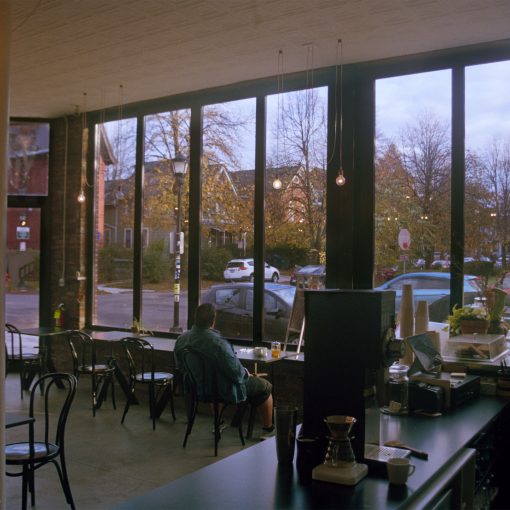
“In the world of the future, I don’t think gender will exist.”
Yana is a leftwing feminist. She studies philosophy in St. Petersburg and blogs about feminism, gender, and politics. We spoke to her about her own experiences trying to think beyond gender in the present, and her vision of an ideal world in the future in which people will no longer need categories of sex and gender at all.
Yana, you’ve been a cyber-activist for a few years already. Please tell us about your blog.
At first, I just wrote for a small group of friends and followers on VKontakte [a popular social media site in Russia]. I posted my poetry and some of my own thoughts. Gradually, I got more and more followers, and I began posting the same content on Telegram and Twitter. I write about the things that interest me: about feminism, politics, philosophy, various aspects of culture through a feminist lens. Sometimes these are just my thoughts, sometimes it’s a whole text that’s written with the aim of influencing someone’s opinion.
How vital is feminism in Russia, in your opinion?
In Russia, discrimination is common. We have a list of professions that bar women; though, for the most part, laws are the same for everyone on paper. In everyday life, however, sexism exists everywhere—repression of women, all kinds of stereotypes, the double burden in reproductive work, with women responsible for taking care of partners and children. And what is called the “third shift”—maintaining an attractive appearance (according to conventional standards), which demands a great deal of time and effort. The problem of domestic violence is especially urgent. All in all, it seems to me that women in Russia have many problems, and, like women all over the world, we need feminism. As far as I can tell, though, most women view feminism negatively, or with suspicion, though they share some of the same values. A typical young, middle-class woman will say: “Well, I’m not a feminist, of course, but . . . “ And what follows is something that’s very much part of a feminist agenda.
Why do you think so many people have a negative view of feminism?
That’s difficult to answer. It’s a question that probably needs to be studied. Here in Russia, feminists have been demonized since the time of the Suffragist movement, when they were depicted as something resembling madwomen. This may also be connected with the cultural legacy of the Soviet Union, when formal equality was imposed from above. As far as I know, after the fall of the Soviet Union and the formation of new governments, many women embraced the possibility of being more feminine, of staying home as housewives, with great enthusiasm. It then became clear that they were far more vulnerable in this role, that it was much worse than it appeared on the surface; but the negative attitude toward overt feminist values remained. I don’t have on hand any materials I could cite; this is just what I imagine to be the case from what I observe.
Could it also be connected with misogyny?
Of course. This is a universal problem; our culture is full of misogyny. Women relate negatively to one another, to themselves, and to everything associated with women. And, naturally, struggling for the rights of women is denigrated, considered to be a waste of time, just some kind of B.S.
Have you encountered discrimination in daily life?
Sure, there is unwanted or dangerous attention from men. And, besides that, in the university where I study, my female classmates and I occupy far less intellectual space than our male counterparts. We speak less, and we are often simply not heard. Many people talk about this problem. It’s hard for me to understand how or why it happens— but it does. For the most part, I haven’t experienced any violence or coercion, but there’s always an underlying anxiety that it might occur. There’s always a fear of some prejudiced or intolerant attitude or behavior toward you. I have same-sex relationships, and I have to hide them. In spite of that, I can say that I’ve been lucky. I’ve only experienced “background” or indirect discrimination—no direct discrimination.
How do you imagine the ideal world of the future?
I think talking about future worlds is very important, because a utopian imagination allows us to think about possibilities that are unthinkable in our existing political systems. And this, in turn, opens possibilities for real change. As for how I envision an ideal future—it will definitely not be a capitalist world. I think that in the future the world will become . . . I don’t know, it will be some sort of weird “cosmic-queer-communism,” maybe. A world in which there is no labor in the usual sense of that word; no mass commodity production, or money. A world in which the connections between people mean more than they do now. And not only the connections between people; because this picture of an ideal world in the future must include other living organisms. We must surpass the discourse of human rights, and maybe even rights in general, and move on to something new, so that we can build a harmonious co-existence with all the species that exist on our planet. We have to find a common language, insofar as it’s possible to talk about language. Of course, this is some kind of misty utopian vision . . . but it’s very important to imagine it; if only for yourself.
Do you share the views on the multiplicity of genders?
I think and write about this a lot. To speak about what it means to “exist” is complicated in terms of gender. When people talk about genders other than male or female, the issue is usually one of identity, of personal feeling or inner experience. But gender is, at the same time, always a social construct. It’s how we are defined by norms and representations that exist outside of us. And in the case of multiple genders, it’s unclear how they correspond to these external structures, because one’s inner experience doesn’t align with them. Within these external structures, a non-binary person doesn’t seem to exist at all. Our current society and culture are not intended for this person. This is why I think that the discourse about multiplicity of gender is a disruptive or subversive force. It doesn’t reveal what, in fact, now exists, but rather dismantles the existing structure of gender relations. It’s possible that this multiplicity of genders is ultimately one of the ways of arriving at a post-gender society. There are various opinions and views about this.
Will feminism exist in a post-gender society?
Of course not. Feminism will have no meaning when there is nothing to struggle for. When all the goals have been achieved, why would it be necessary?
Tatiana Yuminova and Alena Rodicheva




